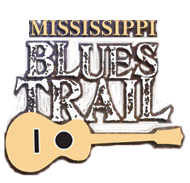Jimmie Lunceford
Jimmie Lunceford - Fulton
This marker is temporarily down for repair.
Jazz bandleader and saxophonist James Melvin “Jimmie” Lunceford was born just outside Fulton on June 6, 1902. He formed his first band, the Chickasaw Syncopators, while teaching at Manassas High School in Memphis in 1927, and by the mid-1930s Lunceford led one of the most popular orchestras in the country. The compelling beat of his blues-influenced music was captured in the band’s slogan, “Rhythm is Our Business.” Lunceford died in Seaside, Oregon, on July 12, 1947.
Jimmie Lunceford led a swing orchestra regarded by many observers as the finest in the land, and no less than Benny Goodman thought that Lunceford’s band was superior to those led by Duke Ellington and Count Basie. Lunceford’s paternal grandparents, Daniel and Gracy Lunceford, arrived in Itawamba County as slaves in the 1840s, shortly after the removal of the Chickasaw Indians. By the 1880s they owned a 320-acre farm, and at the time of James Melvin Lunceford’s birth his parents, James and Ida, owned a 70-acre farm in the Evergreen community; some local residents, though, recall that he was born in the Palmetto community. As an infant Lunceford moved with his family to Oklahoma and later to Denver, where his music teacher was Wilberforce Whiteman, the father of acclaimed jazz bandleader Paul Whiteman.
In 1922 Lunceford began attending Fisk University in Nashville, where he studied sociology and music, excelled in sports, and played in a campus dance band. In 1927 Lunceford began working at Memphis’ Manassas High School as a language instructor and athletic coach, and founded, equipped, and trained the school’s first band, the Chickasaw Syncopators, whose name stemmed from a local neighborhood. Lunceford was very likely the first formal jazz educator, and his work with music programs at Memphis public schools ultimately produced many blues, jazz and soul recording artists. The Chickasaw Syncopators recorded in 1927 and 1930, when they left Memphis to work on the road. Lunceford resumed recording in 1933, and in 1934 his revamped orchestra, featuring arrangements by Melvin “Sy” Oliver, replaced Cab Calloway at Harlem’s prestigious Cotton Club. Although New York remained the band’s base, the “Harlem Express” spent much of their time touring relentlessly across the South.
Lunceford’s many recordings included Blues in the Groove, Muddy Water (A Mississippi Moan), and Uptown Blues, and, although he sold many records, jazz critics claim that his vibrant live performances were never effectively captured on wax. Lunceford’s group was noted for its distinctive two-beat rhythm (Fats Waller called him the “king of syncopation”), as well as its pioneering employment of high-note trumpeters, glee club singers, and highly choreographed stage performances. Lunceford died after eating at an Oregon café where the owner objected to serving African Americans, sparking suggestions that Lunceford and other band members who fell ill were intentionally poisoned. His memorial service in Memphis attracted thousands of fans, and he was buried in the city’s Elmwood Cemetery.

